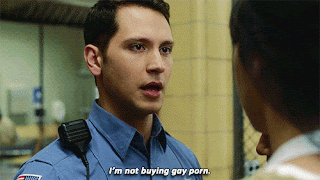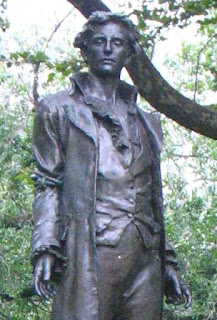 |
| *gimmie hands* |
I. Loved. It. I couldn't look away. It was everything I wanted in a historical drama and more. And if they don't renew Turn, I don't know what I'll do -- Realistically, probably cry out for a few minutes then move on. Maybe read about the real life Abraham Woodhull. Or read a more in depth biography of Major John Andre and weep quietly. Get my Tallmadge fix from his interpretation in Dreamer?
 |
| But I won't get this magical friendship |
I'm feeling kind of pessimistic about it because AMC seems to have a major hard-on for their upcoming spin off series of their other popular shows and probably will cause their other shows to not get as much funding or cancelled all together. If it comes to that, I hope Turn finds a home on Netflix or Amazon Prime. You can't just end a series on how season 2 ended.
With that rant out of the way, I'm going to steer the conversation about what inspired me to write this blog post when I had already written about historical settings in the past. I got thinking about why some historical settings or "based on actual events" storylines work and others don't.
Turn is blessed with extremely well-written dialogue, interestingly framed episodes, and an incredibly talented cast. That certainly helps. I also feel the writers took lessons learned from popular shows on right now. Mary Woodhull has a Skylar White-like character arc for instance but they made her motivations a tad more sympathetic. They took the whole Protagonists who do bad things and Antagonists who do good things angle as made popular in Game of Thrones and Walking Dead but reeled it in slightly. Also, that it is okay to make an antagonist completely unforgivable but to have such a strong presence, you can't help but watch to see what dastardly deed they'll do next. I'm looking at you, Simcoe.
 |
| I mean he brought Starbucks to a Fake Suicide, who does that? |
I am kind of tired of the love triangles and rombuses going on right now. But that may be a personal problem as everyone else seems to like it just fine. Although the one that doesn't irritate me (the Andre-Shippen-Arnold one) seems to not be all that popular.
But the whole Inspired by Actual Events thing. Turn takes liberties with history. Benedict Arnold got with Peggy Shippen earlier than in the actual show (they also had a bunch of kids by the time Arnold betrays us all!) John Andre did court Peggy Shippen before she married Benedict Arnold though. The writers also took liberties with the personal histories of Abe Woodhull, Anna Strong, Caleb Brewster, John Simcoe -- basically everyone. I get why the writers do it -- to make things more exciting and to tie in the story a bit more tightly together. You kind of need that when you are writing about spies and intrigue.
When I was younger, I used to nitpick at these sorts of things. I don't so much anymore. There really is no point. It is like nitpicking that a movie sucks because it is nothing like the book. It is called an adaptation for a reason (not saying there is no such thing as shitty adaptations though). And honestly, if you are watching Turn expecting to learn about the absolute truth of history from it, that is intellectually dishonest. Just read a non-fiction book about the Culper Spy Ring if you want to learn the truth. Watch Turn to be entertained and maybe be informed about something about life in America during the 1770s that will encourage you to read more about it. That's it.
I suppose I will caveat this with saying that I get with some people it is a huge pet peeve to see historical inaccuracies in movies and TV shows. I get that. But unless the movie claims something like, "THE ABSOLUTELY TRUE STORY OF -" you should expect liberties being taken. If you want the absolute truth, watch a documentary. And you should be expected to nitpick if they get a fact wrong.
I suppose that may be another reason why Turn works. It is about a rather obscure topic in Revolutionary War history. Very little was ever known about the Culper Spy Ring until the 1930s. People knew George Washington had a network of spies which aided him win the war but no one really knew much about them or really their methods. Hell, it turns out George Washington knew little about Culper's sources, mainly because the sources wouldn't agree to provide info if their identity was released. That is still not unusual.
 |
| Turn shows this brilliantly with the courting of Robert Townsend |
However, the fact that Turn deals with a topic relatively explored little, the writers have a lot of liberties to take. The more nitpicky people will be less likely able to be nitpicky and can just sit back and enjoy the tales of intrigue set at the dawn of the United States. I'll compare this to, let's say Spielberg's Lincoln movie. Abraham Lincoln has been written about to death. We know a lot about Lincoln and Lincoln was a pretty good movie if you enjoy history. However, I know a lot of people said they felt more like they were in a classroom than in a movie. You won't feel that way with Turn because of the subject matter (SPIES) and we know so little about it.
Turn can develop fictionalized versions of minor historical characters and make them three-dimensional. The conflicted Abraham Woodhull -- who the real life version's father was a Magistrate Loyalist, that much is true -- really develops into a full realized character when you learn like all of us, was a radical college student but at the same time feels he has to fill his older brother's dead shoes to eventually take over his father's place. Or Major Tallmadge who tries so hard to do the right thing, even at risk of court martial, often jokingly references his father the reverend (which the real life Tallmadge's father was). Caleb Brewster is highly offended when he learns the redcoats turn the church in Seutucket into a fortification -- turns out the Brewsters when they first settled Seutucket built the church. Seutucket itself was a loyalist hub but somehow was also a base of operations for the Culper Ring. How did that work? Turn answers that question by establishing Major Edmund Hewlett -- the redcoat in charge of the forces garrisoned there -- who is a complete space cadet (although he means well).
 |
| His reaction to blowing up a school... seriously, not joking |
The writers have room to move, while with writing a movie or a show about Lincoln, you have little breathing room. As a result, the portrayal is usually that of a heavily flawed individual or almost godlike -- nothing remote like an actual person. George Washington kind of falls victim to this in Turn although he is not as bad as some. Off-handedly, I feel the mini-series John Adams does a decent job with making John Adams as an actual character. My mom disagrees. But that could be because I always thought John Adams was a grumpypants and my mom never thought so.
In a way, what I propose is much like how I talked about adapting settings for roleplaying purposes. I argued it is better to take an aspect of the world that is explored little and run with it. And I feel that is what the writers of Turn did. And it is these little historical topics that normally would be a tidbit on a Top Ten Little Known Revolutionary War Facts list that make for good fictionalized tales of history. Little to nitpick, many blank spaces to fill in for your own. And make it awesome!
 |
| Life of a spy for me |






















